To celebrate the fiftieth anniversary of the longest-running science-fiction show in the world, I’ll be taking weekly looks at some of my own personal favourite stories and arcs, from the old and new series, with a view to encapsulating the sublime, the clever and the fiendishly odd of the BBC’s Doctor Who.
Planet of the Dead originally aired in 2009.
Hello, I’m the Doctor. Happy Easter!
– the Doctor sets the mood
Planet of the Dead is light-weight Doctor Who. That wouldn’t normally be a problem. In fact, there’s a significant portion of each season devoted to light-weight run-around adventures. The problem is that it didn’t air as part of a season. It aired as the first piece of Doctor Who since Christmas and the next aired around Halloween. This was something of an attempt to tide fans over, to remind everybody that Doctor Who was still on the air while Steven Moffat and Matt Smith prepared to take over the TARDIS, the BBC got used to filming in HD and David Tennant pursued his career beyond the show.
As a result, the special feel a little funny. In a way, they seem like an attempt to truncate a standard season of Davies’ Doctor Who. The Next Doctor fits the mould of Christmas special quite well. It even snows! The Waters of Mars is the darker second two-parter of the season, dealing with bigger ideas and adult fears. The End of Time is very much a spiritual successor to Journey’s End. All of this is a way of pointing out that Planet of the Dead is clearly designed to serve as the bombastic family-friendly adventure two-parter that typically aired after the first two episodes of a given season.
As such, the logical point of comparison is Rise of the Cybermen, The Sontaran Stratagem or Daleks in Manhattan. Indeed, Planet of the Dead is conspicuous for its gratuitous location shooting; the last time the production team went abroad to film a story was Daleks of Manhattan, even if the cast stayed at home that time. The problem is that those light two-parters are tolerable in the context of a longer series. On its own, Planet of the Dead is far from satisfying.
Watching the specials, it’s easy to forget that these episodes were designed as holiday viewing. The idea was the people would spend a whole day engaged in all sorts of wholesome family activities, eat a large meal together and then retire in front of the television for something everybody could watch that wasn’t too demanding or too complex. It’s startlingly close to the rationale behind those light-weight early two-parters, the stories designed to be driven by monsters and be bright and colourful without getting too deep or dark.
The Doctor repeatedly points this out during Planet of the Dead. He shows up at the end of the teaser carrying an Easter Egg. As he wishes Christina a Happy Easter, he seems to be channelling Hartnell’s rather wonderful decision to wish the viewers at home a Merry Christmas during Feast of Stephen. The Doctor himself jokes about how this is really the first time that show has done an Easter Special. “The funny thing is, I don’t often do Easter,” he explains. “I can never find it. It’s always at a different time.”
On the other hand, the TARDIS seems to lock on to Christmas by default after whatever traumatic season finalé has just unfolded. Which actually makes a reasonable amount of sense. Long day saving the universe? Lost somebody important to you? Need some cheering up? Christmas is a-coming! Plus Christmas comes with a whole iconography that the show can play with. Moffat would riff on holiday classics, but even Davies would play with the idea of snowing at Christmas. Christmas Specials just write themselves. As, arguably, do Halloween Specials. Just make it scary.
It’s a lot harder to imagine what an Easter Special should look like. What consitutes the iconography of Easter? The Doctor shows up with a half-eaten Easter Egg, and makes joking reference to some past encounter with Jesus Christ, but that’s really it. Most of Planet of the Dead could really be any other forgettable episode of Doctor Who. St. George’s Day Special? May Day Special? Pancake Tuesday Special? International Talk Like a Pirate Day Special?
Planet of the Dead is just a very bland piece of work. It’s a few images thrown in a blender and extended out to run an hour. There’s a feisty female companion, who serves as the most conventional companion of this string of specials – tellingly she’s the only young female co-star to be credited in the titles in these five episodes. We get fly aliens who eat poop. And isn’t that just hilarious? We get a rip off of Pitch Black, but without any interest in being scary or atmospheric. We get a flying bus. We even get a guest appearance from Lee Evans.
In a way, Planet of the Dead seems like one of those shopping list scripts from the Nathan Turner era, where a writer was given a list if items to incorporate in the time allotted, rather than allowing concepts to evolve organically. Again, all of this makes sense in context. This is a holiday episode. It’s meant to be the television equivalent of comfort food. It’s not the place for big ideas or high concepts. It’s about touching on as many quirky images as you can as fast you can.
It’s also worth noting that this the last “typical” David Tennant episode. The actor has three more episodes in which he’ll play the Doctor, but this is the last chance for a standard run-around. Even if it’s a holiday special, it’s still a fairly generic piece of Doctor Who and this is the last piece of generic Doctor Who we’ll get from Tennant. In a way, it seems quite similar to what the production team were attempting with Billie Piper back in Fear Her; knowing that this was to be the actress’ last regular episode, so making it appear as regular as possible.
Of course, this is a hugely cynical way of approaching the show. There is no such thing as a “regular” Doctor Who episode. The wonder of the show is that it can be any thing at any time. The show isn’t always Midnight or The Waters of Mars, and that’s a good thing. But what we think of when we think of “typical” Doctor Who isn’t really that typical at all. If somebody asked you to point to a well-done standard piece of Doctor Who, there are any number of examples you could point to, each done in different styles and genres, even within the same era.
Take the Tennant era as an example. Ignoring the exceptional “off-format” episodes like Blink or Human Nature, there’s a wealth of run-around adventures that are all brilliant in a variety of different ways. The Unicorn and the Wasp is radically different from Smith and Jones which is completely different from Tooth and Claw. Trying to reduce down the show’s essence to a bunch of clichés that can be played out on demand is to miss the point entirely; to try to make a “typical” episode is a waste of time and energy.
Which is really what cuts to the heart of the problems with Planet of the Dead, from a storytelling point of view. It doesn’t help that Davies’ supporting character is more than a little bland. Christina is a stereotypical sassy and assertive no-nonsense type who seems like she’s written to be cool and cutting edge. Instead, her lines are often wince-inducing. “That’s how I like things,” she remarks at one point, without a hint of irony. “Extreme.” The same is true of Malcolm’s obsession with the Doctor, which feels a little overly indulgent.
There’s a strange sense of swagger to Planet of the Dead, as if Davies is convinced that he can do no wrong – a massive amount of self-confidence about how Doctor Who sees itself. There’s nothing wrong with this. The show’s entire fourth season was one extended victory lap. After all, Davies resurrected the show and turned it into one of the biggest things on telly. Confidence is well-earned. And it’s hard to hate that confidence when it’s incorporated into exciting stories and intriguing narratives. It’s quite another when that confidence is radiating from flat characters in a generic plot.
Which raises another, larger meta problem with Planet of the Dead. The show was filmed overseas, in the United Arab Emirates. Which is great, in theory; location shooting is nice. After all, one of the best Doctor Who episodes ever produced was filmed in France. Sure, John Nathan Turner took it a bit far in The Two Doctors and Arc of Infinity, but there’s nothing wrong with giving Doctor Who a global feel. It is, after all, one of the BBC’s most successful international franchises.
However, the problem is that the U.A.E. is not the most tolerant of regimes in the world. In fact, its attitudes towards homosexuality are downright barbaric. There’s a debate to be had about at what point the politics of a wider society should play into the practical decisions made by the production staff on a British science-fiction show, but this seems a pretty clear-cut case. It’s very hard to defend spending the money of British license-fee payers to film the episode in a country with such aggressive politics regarding homosexuality.
This is quite similar to the controversy that FIFA generated by choosing to hold the 2012 World Cup in the neighbouring country of Qatar. That choice was so brazen that the head of FIFA responded to criticisms by suggesting that gay fans should simply not have sex while attending the event, all while arguing that FIFA was really just trying to make the event more open and accessible around the world. Ironically, it seems tolerance is only important when dealing with intolerant people.
More than that, though, Doctor Who isn’t just any show filming in a homophobic country. Doctor Who is a show with a strong gay following. It’s a show that is massively important to the cay community, and has a long history of association with gay rights and gay fans and gay creators. It’s a show that champions equality and open-mindedness, and tries to present a diverse view of society and history. Minority characters with a variety of orientations exist and have existed across history in the show.
It’s very tempting to turn this into a discussion about Davies himself, and that’s not fair at all. Davies himself has pointed out how unfair it is to heap titles like “most influential gay man” upon him, and his arguments are valid. Any attempt to pigeon-hole Davies as a “gay writer” is reductive and unfair. His personal sexual orientation informs his writing, just as his religious reviews, or his personal history, or any number of personal factors do; but it doesn’t define him any more than any Steven Moffat’s heterosexuality defines him. This isn’t about Davies personally, but about the series in a wider context.
So filming just outside Dubai feels like a mistake. It’s a choice made for obvious financial reasons, and it provides the episode with a much more effective visual style than it would have filmed against a green screen or on some studio set somewhere. It makes Planet of the Dead look professional and stylish; but it’s not worth the cost. It’s a cynical, if understandable, move. It’s short-sighted and a little tone-deaf.
After all, it’s not as if the show needed Dubai. Again, it’s always risky to talk about what is and isn’t needed in terms of telling a story, but it’s hard to justify the choice to film in Dubai in terms of the finished production. Planet of the Dead is clearly constructed as an Easter Special, and it would be one thing if Davies were filming in the desert to evoke the origins of the holiday, but there’s no reason that the episode couldn’t be filmed on a quarry similar to the one used for The Doctor’s Daughter or even The Impossible Planet.
It stands as an ill-judged decision in an entirely different manner than the decision to film in Spain or Amsterdam was an ill-judged decision made by Davies’ predecessor. In this case, the script does use the location a lot better than the scripts used the locations in Spain or Amsterdam. However, it doesn’t add nearly enough to excuse the decision to spend the show’s money in a country that is openly contemptuous of LGBT rights.
Of course, it’s possible to try and construct a justification about this choice. It might be worth suggesting that Doctor Who usually films in a country that doesn’t have the strongest track record when it comes to the human rights of the gay community, and which doesn’t afford members of that community the same standing as heterosexual individuals, but there’s a world of difference between the way that Britain treats gay rights and the way that the U.A.E. treats gay rights.
However, even outside of that, Planet of the Dead just feels like a bland space-filler. There are a few nods towards the overall arc of the specials. “The aristocracy survives for a reason,” Christina suggests, foreshadowing the return of the Time Lords. “We’re ready for anything.” The Tenth Doctor is assured that his song is to end soon. However, none of these ideas are advanced in any substantial way, and there’s no real sense of linear progress. (Not that there’s that much linear progress in Davies’ seasons of Doctor Who, but at least ideas are hinted at and developed across an entire year instead of five specials.)
It’s also interesting to note how heavily Davies seems to be drawing from Harry Potter when it comes to these specials. Planet of the Dead features a flying bus, which can’t help but recall the franchise’s knight bus, another improbable means of public transformation that refuses to conform to the laws of physics, designed along the principle of a double-decker bus. (Though the knight bus is triple-decker.)
Davies has always been influenced by Harry Potter, which makes sense given how he compares the experience of modern kids with Harry Potter to his own experiences with Doctor Who. Reportedly, he attempted to convince J.K. Rowling to write for the show in 2005, but she declined. One of the outfits glimpsed in the TARDIS wardrobe in The Christmas Invasion evokes the Hogwarts outfits. In The Writer’s Tale, he considered building the 2008 special around a guest appearance from Rowling. His latest children’s television is Wizards vs. Aliens, perhaps the most logical fusion of Doctor Who and Harry Potter imaginable.
So the influence feels somewhat conscious. The End of Time features consciously literate and fantastical narration from Timothy Dalton, to the point where he is credited as “the narrator.” Sure, he turns out to be Rassilon, but it’s quite clear that his narration is distinct from his evil Time Lord character – why would Rassilon care about Wilf or bad dreams? Similarly, the resurrection of the Master seems constructed to evoke the resurrection of the Dark Lord Voldemort. Davies clearly has been heavily influenced by the franchise. (To the point where the director linked with rumours about adapting Doctor Who to the big screen was David Yates.)
Still, none of this really redeems Planet of the Dead, which winds up being a completely forgettable trip for David Tennant.
Filed under: Television | Tagged: bbc, Billie Piper, christmas, david tennant, doctor, doctor who, DoctorWho, Easter, matt smith, planet of the dead, Sontaran Stratagem, steven moffat, tardis, waters of mars |















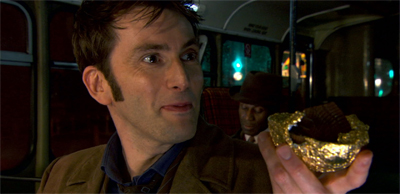
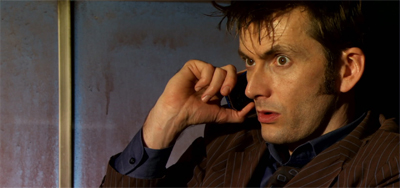
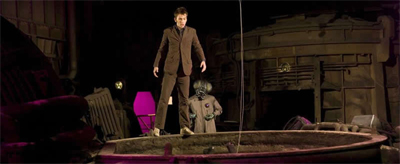
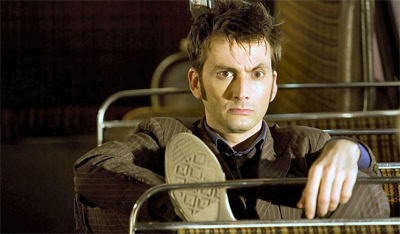
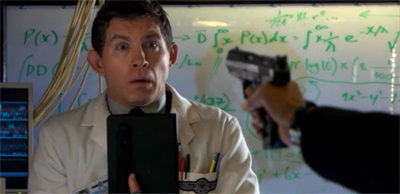
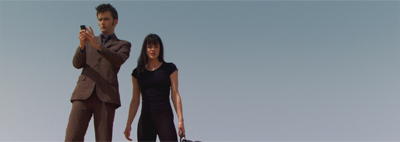
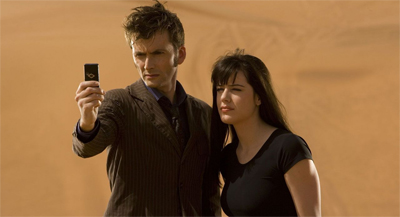
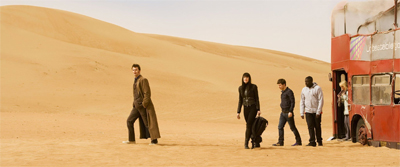
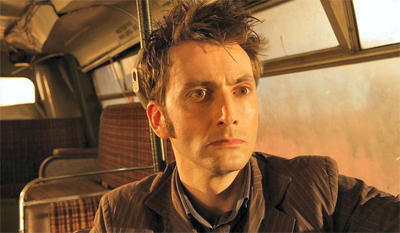
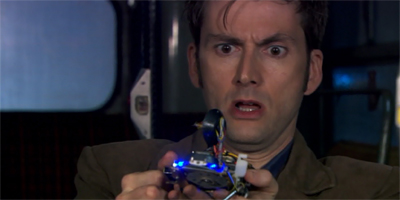
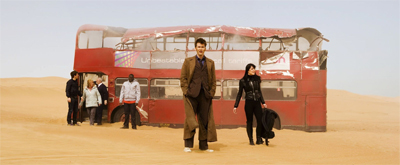
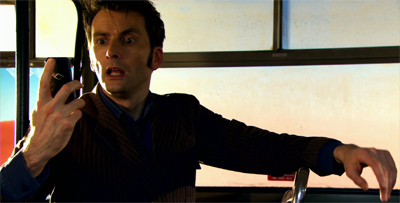






Leave a comment